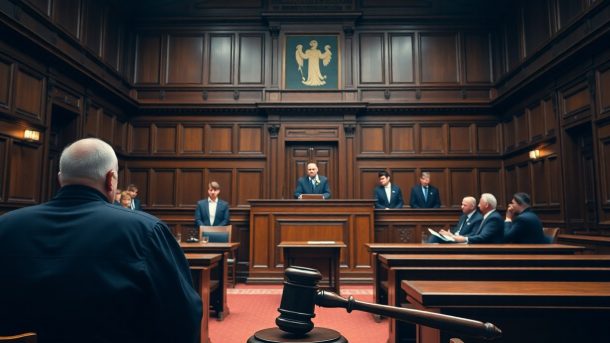Most people are unfamiliar with the workings of a UK Magistrates’ Court until they find themselves involved in a case. Understanding the process can be beneficial, whether you are a defendant, a witness, or simply curious about the judicial system. In this post, you will learn about the various roles, procedures, and outcomes typical in a Magistrates’ Court. For further insights into the role of magistrates, you can visit Magistrates – Courts and Tribunals Judiciary.
Key Takeaways:
- Types of Cases: The UK Magistrates’ Court primarily handles minor criminal offenses, including traffic violations and minor assaults, as well as some family law matters.
- Role of Magistrates: The court is presided over by magistrates, who are usually volunteers from the community, or a District Judge, who is a legally trained professional.
- Sentencing Options: Magistrates can impose a range of sentencing options, from fines and community service to short-term imprisonment, depending on the severity of the offense.
Overview of the UK Magistrates’ Court
While the UK Magistrates’ Court may seem straightforward, it plays a vital role in the British justice system. This court is the first tier of the judiciary and primarily handles less serious criminal cases. Its design fosters efficiency and accessibility, allowing for quicker resolutions and easier navigation for individuals involved in legal matters.
Purpose and Function
Around the country, the Magistrates’ Court is instrumental in ensuring that justice is served promptly and fairly. It deals with preliminary hearings and minor offences, promoting community engagement in the justice process. Additionally, it seeks to provide a supportive environment for defendants as they navigate their legal challenges.
Types of Cases Handled
Handled within the Magistrates’ Court are various case types, focusing primarily on less severe criminal matters. Here is a breakdown of what you might encounter:
| Offences Against the Person | Minor assaults, harassment |
| Public Order Offences | Disorderly conduct, protests |
| Theft and Burglary | Shoplifting, petty theft |
| Traffic Offences | Speeding, driving without insurance |
| Licensing Offences | Selling alcohol without a license |
You may find that these case types cover a broad spectrum of legal issues, often involving members of your local community. The ideal aim is to address and resolve matters fairly while allowing for rehabilitation and minimal disruption.
- Speeding violations
- Drug offences
- Criminal damage
- Breach of bail conditions
- You might also see cases of minor fraud
Further Insight into Types of Cases Handled
Further to the above, the Magistrates’ Court also coordinates several ancillary functions. This includes the issuing of search warrants and carrying out preliminary hearings for more serious offences that may later be transferred to Crown Court.
| Housing Disputes | Eviction notices, landlord-tenant issues |
| Family Matters | Child custody, maintenance issues |
| Maintaining Peace | Inefficiencies regarding domestic disputes |
| Appeals | From lower decisions in various courts |
| Community Rehabilitation Orders | Programs for offenders |
- Various types of minor civil claims
- Environmental offences
- Child protection cases
- Education-related offences
- Assume that your case may involve one or more of these categories

Structure of the Court
Any UK Magistrates’ Court typically consists of a bench of magistrates, who may be either lay magistrates (untrained volunteers) or district judges (legally trained professionals). You will also find a court clerk present, who provides legal advice to the magistrates and ensures court procedures are followed correctly. The layout of the court is designed to maintain order, allowing for a fair hearing, as well as providing a public area for observers.
Roles of the Magistrates
Beside the responsibilities of presiding over cases, magistrates are tasked with making decisions on issues such as bail and sentencing. They serve as impartial arbiters, applying the law fairly while considering the specific circumstances of every case you may be involved in. Their role requires commitment to justice and the welfare of the community.
Representation and Legal Counsel
By seeking representation, you can ensure your rights are protected during proceedings. While legal representation is not mandatory in a magistrates’ court, having a solicitor or barrister can significantly enhance your understanding and handling of the legal process.
Another important aspect to consider is how legal counsel can guide you through the complexities of your case. Their expertise means they can formulate effective strategies, represent your interests during negotiations, and advocate on your behalf during hearings. Engaging a legal professional helps you navigate potential pitfalls, ensuring you have a voice in the judicial process and a clearer understanding of the outcomes that may arise.
The Court Process
For those attending a UK Magistrates’ Court, the process typically begins with the arraignment, where charges are read, and pleas are entered. Following this, the magistrates will oversee the hearing, which involves examining the evidence presented by both the prosecution and the defense. This structured environment ensures that each party has the opportunity to present their case while adhering to court protocols. Throughout the proceedings, the magistrates will make notes and take into account all the information before reaching a decision.
Steps in a Typical Hearing
Typical hearings unfold in a series of steps. First, the defendant’s plea is entered, followed by the presentation of evidence from both sides. Witnesses may then be called to testify, providing statements that support either the prosecution’s or the defense’s case. After all evidence is submitted, the magistrates deliberate, consider the facts, and eventually deliver their verdict, which is then followed by sentencing if necessary.
Evidence and Witnesses
Above all, evidence and witness testimonies play a significant role in your hearing. Both the prosecution and defense will present various forms of evidence, which can include documents, photographs, and other relevant materials that support their claims. Witnesses can provide firsthand accounts, which can influence the outcome of your case significantly.
Considering the importance of evidence and witnesses, you should understand that credible and relevant information can greatly impact your case’s outcome. The magistrates will evaluate the reliability of the evidence presented and the demeanor of witnesses during their testimonies. Ensuring that individuals who testify on your behalf are well-prepared can be advantageous, as their insights can sway the magistrates’ perception of the events in question. Every piece of evidence and each witness contributes to building a narrative that could enhance or diminish the strength of your position in court.

Sentencing Powers of Magistrates
Once again, it’s vital to understand that magistrates have a range of sentencing powers to address different types of offenses. Their decisions can vary significantly based on the severity of the crime and the circumstances surrounding it, allowing them to choose an appropriate penalty that serves justice and rehabilitation.
Types of Sentences Imposed
Imposed sentences can vary widely depending on the nature of the offense. These include:
- Custodial sentences
- Community orders
- Fines
- Discharges (absolute and conditional)
- Driving disqualifications
Assume that you have a case to present; the sentence will be tailored to fit both the crime and your background.
Options for Appeals
With an unfavorable sentence, you have the right to appeal the magistrates’ court decision. This allows you to request a review of the proceedings in a higher court, which may lead to a different outcome.
Magistrates typically have limited powers when it comes to the severity of their sentences; therefore, it’s important to know that if you find their decision unsatisfactory, you can take action. If you choose to appeal, it can be done on points of law or on the grounds that the sentence was excessive. An appellate court will review the case and determine if adjustments are warranted.
Rights of Defendants
To ensure a fair trial, you have specific rights as a defendant in a UK Magistrates’ Court. These rights include having legal representation, the ability to present your case, and the right to remain silent. You are also entitled to be informed about the charges and evidence against you and to have a fair hearing without undue delay. Understanding these rights is imperative for navigating the legal process effectively.
Legal Rights During Proceedings
Below, you will find that during proceedings, your legal rights protect you from unfair treatment. You can request the presence of a lawyer, access legal advice, and challenge evidence presented against you. Enforcing these rights allows you to participate actively in your defense and ensures that the court adheres to properly established legal standards.
Support Services Available
Beside your legal rights, numerous support services exist to assist you as a defendant. These can include victim support organizations, legal aid services, and counseling resources to help you cope with the stress of court proceedings.
Support services can provide you with imperative information about the legal process, assist with paperwork, and connect you with professionals who understand your situation. Support can also range from emotional assistance to practical advice on how to prepare for court. Utilizing these resources can help ease the burden of navigating the complexities of the legal system, allowing you to focus on your case with the support you need.
Differences Between Magistrates’ Court and Crown Court
Unlike Crown Court, where serious criminal cases are adjudicated and juries are involved, Magistrates’ Court handles less severe offenses, which are typically resolved more quickly. This distinction influences the court’s procedures, types of cases processed, and the potential penalties imposed on defendants. Ultimately, understanding these differences helps you navigate the legal landscape more effectively.
Jurisdiction and Scope
Court jurisdiction refers to the types of cases that each court can handle. In Magistrates’ Court, you will find lesser offenses such as minor theft, traffic violations, and public disorder cases. Crown Court, on the other hand, has jurisdiction over serious crimes like murder, rape, and armed robbery, accommodating more substantial sentences and legal complexities.
Trial Process Variations
Above all, the trial processes in Magistrates’ Court and Crown Court differ significantly, affecting how cases progress through the system. Magistrates’ Court usually involves a bench of magistrates making the rulings without a jury, while Crown Court incorporates juries to reach verdicts in more severe cases. Additionally, the legal representation required and the overall ambiance in each court can greatly vary.
Jurisdiction heavily influences the trial process in both court types. In Magistrates’ Court, the focus is on expediency, with cases typically resolved in a single hearing without complex legal arguments. Crown Court trials are often longer, involving detailed procedures, witness testimonies, and legal debates before a jury renders a verdict. Understanding these variations allows you to better prepare for what to expect in each court setting.
To wrap up
Taking this into account, understanding what happens in a UK Magistrates’ Court empowers you as a citizen to navigate the legal system more effectively. You will find that these courts handle a variety of cases, focusing primarily on minor offenses and preliminary hearings for more serious charges. Engaging with the court process, from attending hearings to following the decisions made by magistrates, can provide you with insight into your rights and responsibilities within the justice system, allowing you to approach legal matters with greater confidence and clarity.
FAQ
Q: What types of cases are heard in a UK Magistrates’ Court?
A: Magistrates’ Courts primarily handle lesser criminal cases, including minor offenses such as theft, public order offenses, and driving violations. They also deal with family matters, such as child custody and domestic violence cases, along with civil matters like licensing disputes. Some serious cases may start in Magistrates’ Courts but will be sent to Crown Courts for further proceedings.
Q: What is the role of the magistrates in a Magistrates’ Court?
A: In a Magistrates’ Court, magistrates—who are usually volunteers from the community—are responsible for hearing the cases presented. They assess the evidence, make determinations regarding guilt or innocence, and decide on the appropriate penalties for those found guilty. The magistrates may work alongside a legal adviser, who provides guidance on the law and procedure to ensure fairness in the court’s decisions.
Q: What is the process for individuals attending a Magistrates’ Court?
A: When individuals attend a Magistrates’ Court, they will first enter the courtroom where their case will be called. They will have the opportunity to plead guilty or not guilty. If they plead not guilty, a trial date will be set. During the hearing, both the prosecution and defense can present evidence and witnesses. After hearing the case, the magistrates will deliver their verdict, and if found guilty, they will impose a sentence, which can vary from fines to community service or imprisonment, depending on the offense.













Recent Comments